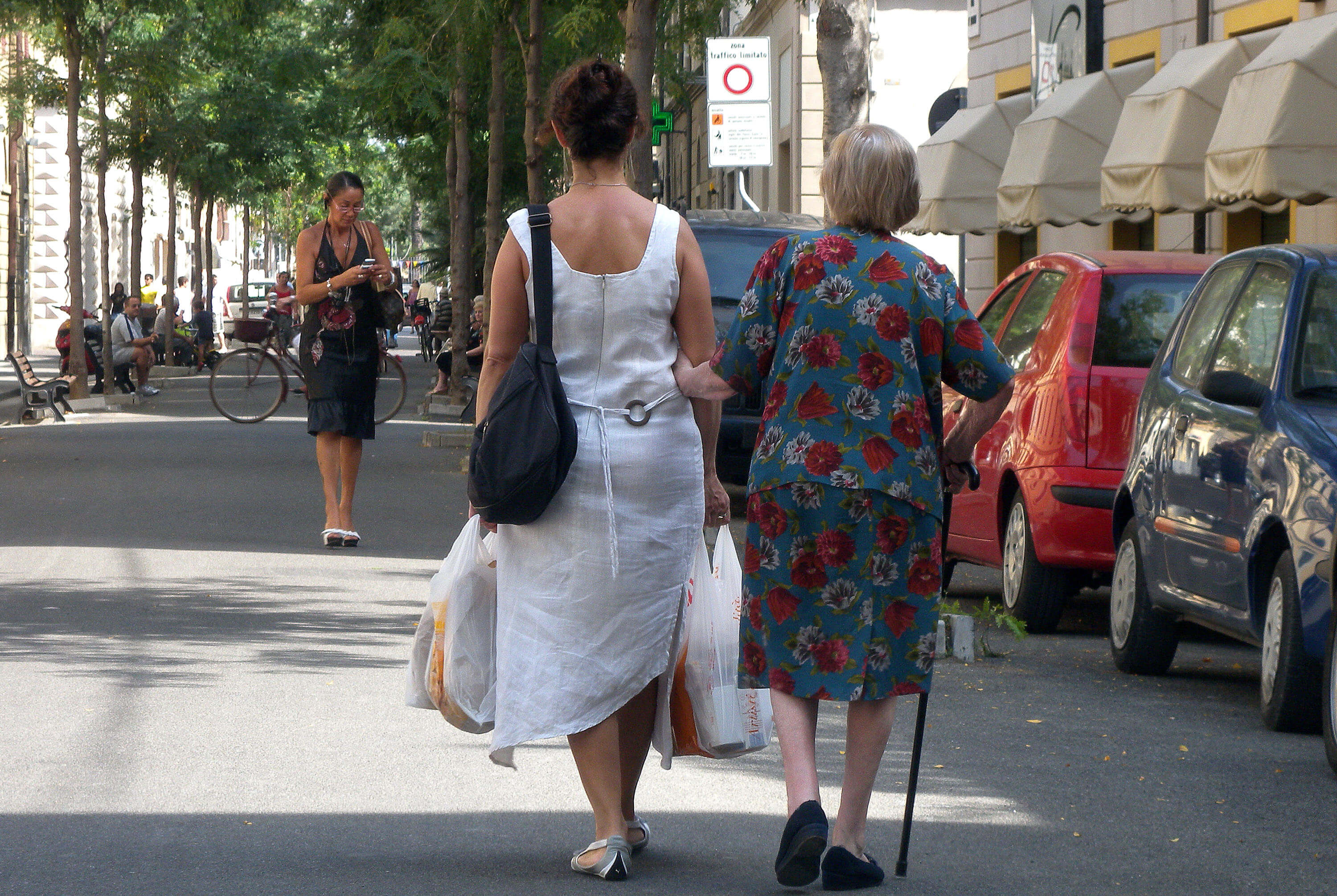By Andriy Avramenko
After the World War II Italy, a traditional source of migration to the US, Argentina, Brazil and different Latin American countries, was experiencing a remarkable economic growth alongside with other Western European states, known as “Trente Glorieuses”. In 1990s Italian GDP per capita (PPP) was higher than similar indicators of France and the United Kingdom. In 2001 the average life expectancy surpassed 80 years. A spectacular economic growth resulted in a massive inner population displacement, a stark disparity between industrial North and more economically backward South and, in general, dramatically transformed Italian society. Post-industrial Italy faced the problem of population aging.
In 2000 the economy of Ukraine finally recovered after the decade of recession and market transition. Quite paradoxically, the scale of migration from the country rose rapidly alongside with national economy. Ukrainians were discovering new destinations for labour migration, namely the Southern Europe. In 2003 the Italian National Institute of Statistics (ISTAT) for the first time included Ukrainians to its reports. At that time there were only 12 730 Ukrainian citizens in Italy. The next year, amid an unprecedented 11,8% growth of Ukrainian GDP, the number of Ukrainian migrants in Italy more than quadrupled, and over the 13 years grew in total 13-fold. According to the last official data there are approximately 239 thousand of Ukrainians in Italy, which makes them fourth biggest foreign group.
Although in Ukraine, especially its Western part, thousands of children have been raised without parent(s), the issue of mass-migration is not reflected in media, culture and public discourse, unlike the resettlement to the North America in the beginning of XX century. A family member working abroad has become an evident norm. However, this issue becomes more visible after all. For instance, in 2017 Italy and Ukraine co-produced comedy Easy – Un viaggio facile facile, which received several international awards, not to mention Ukrainian domestic novels and films.
Ukrainian community in Italy drastically differs from other foreign groups by sex ratio: women make up more than 80%. They are also older than average non-EU migrants (average age of Ukrainians in Italy is 42.2 years, whereas for all non-EU migrants it is 31 years). The common occupation for women is care for elderly or cleaning. Corriere della Sera refers to a so-called ‘Italian syndrome’, while describing psychological difficulties experienced by badanti. Francesca Vianello characterized a typical trajectory and motivation of Ukrainian women: they usually perceive their relocation to Italy as a temporary (one-two year) remedy for earning enough money to support their families, sending children to the university etc. (Vianello, 170). This perception of self greatly shapes their existence abroad: Ukrainian women rarely invest in the improvement of precarious living conditions. And yet, the return home is permanently postponed to the undefined future, moreover as socio-economic situation in Ukraine remains difficult, despite some improvements. Even though these women may already have adult children or grandchildren, they primarily identify themselves as mothers to confirm family devotion and legitimize their absence.

However, some of them pursue a more stable life and try to bring their children to Italy. The awaited reunification after years of separation may not be as fulfilling as it seems. In this case, Ukrainian teenagers usually undergo a downward mobility from what Vianello calls “remittance bourgeoisie” in Ukraine to migrant working class in Italy with all its implications (Vianello, 174).
Sofia
The protagonist of this article represents rather an exception in the practice of young Ukrainian women in Italy. Sofia (name changed) was born in a small village in Western Ukraine. Having graduated in Psychology from a regional university, thanks to the family connections she started a job in a state employment centre in the small town nearby her village. Gradually she came to understanding that most of her coworkers stayed there just because they did not have any other options. After one year of meaningless and inefficient work she was so overwhelmed, that when she had an appendectomy it was interpreted as a sign for change: not only of the job, Sofia dared to emigrate, joining her mother who had been working in Italy as badante for many years.
“I did not know what to expect, – confesses Sofia – I just went away without knowing when I would come back and what would come next. It was a dramatic change, but I did not have a clear strategy and let things slide. That is exactly what happened: I ended up in a situation I could neither change, nor manage, I became illegal.” When Sofia parted to Italy, she knew that she would be illegal: “At the time, I was thinking it was the only possible solution to remain in Italy. That was the experience of my mother, my aunts, their friends. That is why I also thought I would do the same to wait afterwards for a possibility of legalization”.
She found herself in Milan, joining her relatives. The new life started with fascination: “At the beginning, it was a “tourist stage”, when everything is beautiful, new, everyone is polite and generally everything is much better [than in Ukraine]. Until the moment you realize that you need to live somehow in this country.” First couple of months Sofia dedicated to studying Italian attending courses for foreigners organized by churches.
Without documents and sufficient language command she managed to find a job in a bar, where was underpaid upon the ground of being an apprentice. She admits that she did not miss Ukraine a lot, as she never perceived it as a “cultural motherland”, instead she enjoyed the atmosphere of Italy. But after 1,5 years of work she lost this job.
Then Sofia started working as cleaner, which lasted two years. After the social ambiance of the bar, cleaning all alone was very hard, she felt she was degrading. Sofia was dating an Italian and expected they would eventually marry. But this relationship broke up. She ended up depressed and alone face-to-face vital challenges. She recalls that back then she was thinking of going to university, but it took time to let herself pursue this step. There were no role-models around or people to consult with. On the other hand, returning to Ukraine for her would mean acknowledging her weakness and failure for all she had been fighting for so long.
It is the solitude which, in her opinion, is the most painful for illegal migrants: “I was very very lonely. I think all people without documents have this “complex of invisibility”. Wherever you go, you are not treated properly, you cannot work, have no rights and you limit yourself psychologically, feeling in distress. For four years I even did not leave the city, fearing of an accidental control. I could not practice psychology or things which I liked, even simply work as a waitress or obtain an official language certificate. After many efforts I was hopeless, my self-esteem was extremely low.”
Nevertheless, the desperate situation was at least partly eased by volunteers. Until recently, illegal migrants in Italy could benefit from services of different NGOs, either secular, or religious. Sofia received medical services from the NGOs Naga and Opera San Francesco. The latter even provided a possibility of psychotherapy, which helped to combat depression and dare to change her life again. By the way, since September 2018, when the so-called ‘Salvini decree’ came into effect, the position of migrants significantly deteriorated.

Sofia realized that she would not be able to bear such life for a long time and decided to “legalize” herself. She came back to Ukraine and applied to one of Italian universities. While waiting for all bureaucratic technicalities being resolved, Sofia went to Italy for a short-term work to earn some money for her initial period of studies. This time she was badante looking after a person with Parkinson disease. This experience definitely proved that this occupation is not for her at all.
Sofia decided to continue her specialization and was admitted to a Master’s programme in Social Psychology. She studies and works as babysitter. For the obligatory internship she found an organization helping women who suffered from domestic violence. At the interview she shared her story of being an illegal migrant, her experience at the employment centre and major in psychology were also useful. Thus, she was accepted for the internship.
She considers family factor and lack of self-confidence the common obstacles for Ukrainian women in Italy for searching a more qualified job. According to the data of Italian Ministry of Labour and Social Policies, as of 2013, Ukrainian immigrants were relatively more qualified than other non-EU immigrants, 70% have at least secondary-level education, and 22% completed also tertiary-level education, compared to only 12% among other non-EU immigrants (Vianello, 167). Sofia asked her mother, a former math teacher, why she did not try to do something else. Because of fear, she replied. For instance, fear of lacking some terminology if she were a tutor. Sofia thinks many women share this problem – low self-consciousness and belief that woman needs to devote herself to family without looking for a better self-realization.
Sofia is trying to persuade other female migrants by her own example to believe in themselves and the possibility of positive change. She has no intention to come back to Ukraine, just as a temporary visitor. Still, in a big Italian city she strongly misses her rural vegetable garden. But now, when the borders are open for her, she always has an opportunity to come there for a holiday.
About the author
Andriy Avramenko is a Master’s student in Sociology at the National University of Kyiv-Mohyla Academy. His interests include social transformations and Central- and Eastern-European studies.
Credits: Originally published at Ukrainian “Political Critique” within journalist project on economic migration from Ukraine “The Paths of Labor”. The article first published at the Political Critique website within the framework of ‘Invisible Labour’ project, exploring causes and effects of mass labour migration from Ukraine, its economic, social and cultural implications both in Ukraine and in the EU.
![Political Critique [DISCONTINUED]](https://politicalcritique.org/wp-content/uploads/2015/09/Political-Critique-LOGO.png)
![Political Critique [DISCONTINUED]](https://politicalcritique.org/wp-content/uploads/2015/09/Political-Critique-LOGO-2.png)